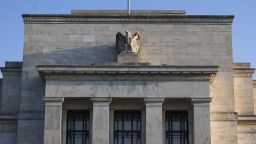The Bank of England downgraded its forecasts for UK economic growth Thursday and kept interest rates unchanged, even as it warned that the Israel-Hamas war could push up energy prices and inflation won’t return to target for another two years.
The central bank now expects gross domestic product to have flatlined in the July-to-September quarter and to grow just 0.1% in the current quarter, marking gloomier forecasts than its projections in August.
“There are increasing signs that higher interest rates are weighing on economic activity and we see that in weaker activity data and in a range of business surveys,” Governor Andrew Bailey told reporters.
The bank, which stopped raising rates in September after 14 successive hikes, thinks more than half of the impact of higher borrowing costs on GDP is still to hit the economy, which suggests that growth could slow even more sharply.
Despite the economic slowdown, the Bank of England sees inflation returning to its 2% target only at the end of 2025, roughly six months later than previously forecast.
“Let me be clear, there is absolutely no room for complacency. Inflation is still too high,” Bailey said, also pointing to the risk that the Israel-Hamas war could lift energy prices.
Although the central bank kept interest rates unchanged for the second time in a row, it did not rule out further rate hikes and said rate cuts were not yet on the table. Six members of the monetary policy committee voted to hold rates, while three voted for a 0.25-percentage point increase.
The decision keeps the main borrowing cost for commercial banks in the United Kingdom at 5.25%. That is the highest level since February 2008.
“We will be watching closely to see if further increases in interest rates are needed… it is much too early to be thinking about rate cuts,” Bailey said.
“We will keep interest rates high enough for long enough to make sure we get inflation all the way back to the 2% target,” he added.
The Bank of England’s decision mirrors that of the Federal Reserve, which also kept rates on hold Wednesday. The European Central Bank, for its part, paused its rate-hiking campaign for the first time in 15 months last week.
All three central banks pointed to a further slowdown in economic activity, as higher borrowing costs dampen demand.
Inflation still a concern
The Bank of England expects inflation to continue easing, but warned of risks to that outlook.
UK consumer prices increased 6.7% in September compared with a year earlier, at the same rate as in August when inflation unexpectedly eased. Food prices notched their first monthly decline in two years in September, according to the Office for National Statistics. But energy prices fell at a much slower annual pace than in August.
The Bank of England thinks inflation will slacken below 5% in October and remain around that level for the rest of the year.
That will come as good news to UK Prime Minister Rishi Sunak, who has promised to halve inflation this year to around 5% as one of his five main pledges to voters.
But Bailey cautioned that risks to inflation remained on the “upside.” He pointed to strong pay growth, stubborn services inflation and the Israel-Hamas war, which threatens higher energy prices. “So far that hasn’t happened and that’s obviously encouraging, but the risk remains there,” he added.
In contrast to Bailey’s remarks, Martin Beck, chief economic adviser to the EY ITEM Club, said there could in fact be more “downside surprises” to inflation in the coming months. He pointed to outright falls in producer prices and contracting money supply.
“Growth in credit to the private sector has slowed to a crawl and the economy appears to be increasingly feeling the impact of the past rises in interest rates, with, at best, a period of stagnation likely over the next few quarters,” he said.







